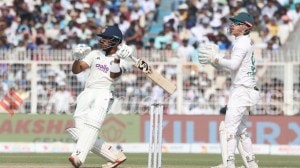Stay updated with the latest - Click here to follow us on Instagram
Supreme Court on Adani-Hindenburg row: 5 top quotes from CJI-led bench
'SEBI must carry out the investigation to its logical end,' the top court said. Here are the highlights from the Supreme Court’s verdict on the Adani-Hindenburg row
 The Hindenburg report had accused the Adani group of “brazen stock manipulation and accounting fraud scheme over the course of decades”.
The Hindenburg report had accused the Adani group of “brazen stock manipulation and accounting fraud scheme over the course of decades”.The Supreme Court Wednesday directed market regulator SEBI to complete its investigation into the allegations raised by US-based short-seller Hindenburg against the Adani Group of companies within three months.
“SEBI must carry out the investigation to its logical end,” the court said, adding that “no ground was made out for transfer of probe” from the regulatory board. A bench led by Chief Justice of India stated that the power of the court to enter regulatory domain of SEBI is “limited”.
The Hindenburg report had accused the Adani group of “brazen stock manipulation and accounting fraud scheme over the course of decades”. The report prompted a political firestorm, with the Opposition demanding a Joint Parliamentary Committee probe into the allegations.
Here are the highlights from the Supreme Court’s verdict on the Adani-Hindenburg row:
🔴 “SEBI must carry out the investigation to its logical end,” the court said, adding that “no ground was made out for transfer of probe” from the regulatory board.
 SC on SEBI investigation
SC on SEBI investigation
🔴 “SEBI has completed investigation in 20 out of 22 matters. Taking into account the assurance of Solicitor General, we direct SEBI to complete the investigation in the other two cases preferably within three months,” the court said.
🔴 “Allegations of conflict of interest of expert committee members are unsubstantiated and rejected,” the apex court held.
 SC on power to transfer investigation
SC on power to transfer investigation
🔴 The top court further said the Centre and SEBI should take into consideration recommendations of the expert committee to strengthen interest of the Indian investors.
 SC on claims of conflict of interest of expert committee members
SC on claims of conflict of interest of expert committee members
🔴 The Supreme Court also cautioned petitioners to refrain from relying on unsubstantiated reports lacking evidence. “Reliance on newspaper reports and third party organisations to question the statutory regulator does not inspire confidence. They can be treated as inputs but not conclusive evidence to doubt SEBI probe,” the SC said, according to Live Law.







